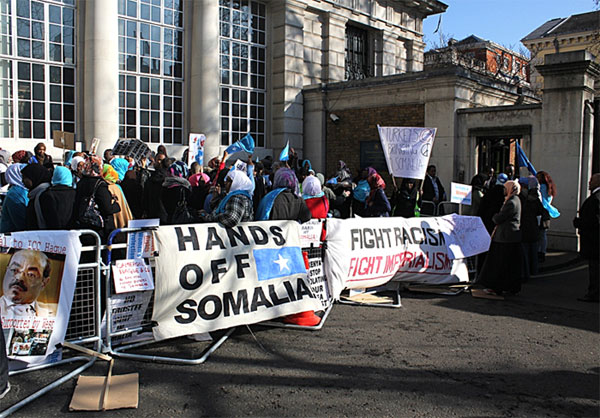Fight Racism! Fight Imperialism 226 April/May 2012
Photo by Aimee Valinski
The London Conference on Somalia on 23 February, convened and hosted by British Prime Minister David Cameron, was the 15th attempt since 1993 to solve the ‘Somalia problem’, all of which have ended in failure. The Conference was a grubby cover to enable Britain and the US to bargain over Somalia’s oil resources. Its final communiqué stated that ‘decisions on Somalia’s future rest with the Somali people’, but like the final statement read by Somalia’s Transitional Federal Government (TFG) Prime Minister Abdiweli Mohamed Ali, it was written before the Conference. They agreed to ‘inject momentum into the political process, strengthen AMISOM [the African Union mission] and help Somalia develop security forces, build stability, and tackle pirates and terrorists’.
The presidents of autonomous Puntland, Somaliland and Galmudug and Islamist militia ASWJ attended the Conference along with three members of the TFG. Britain promised ‘humanitarian and security assistance’ to the respective autonomous regions in the country. United Nations Security Council Resolution 2036 was passed before the Conference to avoid it ‘dominating the agenda’: AMISOM will be increased from 12,000 to 17,731 police and troops, and equipment support increased, doubling the required UN budget to $500m annually. 4,600 Kenyan troops make up the bulk of the increase.
The London Communiqué proposes the TFG be dissolved, that elections take place when its mandate runs out in August 2012 and that a ‘representative government’ replace it. The TFG’s mandate actually ran out in 2011 but it was undemocratically extended by 12 months following pressure from Uganda, then the main contributor to AMISOM. Following a brawl in parliament in January, where the Speaker had to be removed, the TFG has been in paralysis. Gelled by personal greed, it has been characterised since 2004 by a power struggle between the President and the Speaker of the parliament, who both try to use the Prime Minister as their dummy. The TFG has no legitimacy or support amongst Somali people, no money (97% of its funds are from international donors), no civil service, no troops and no sense of shame. It has been a monumental and expensive eight-year failure imposed on Somalia by US and British imperialism. There is no evidence that a new technocratic government will be any different.
As well as piously ‘condemn[ing] terrorism and violent extremism’ the London Communiqué proposed a Joint Financial Management Board (JFMB) ‘to increase transparency and accountability in the…use of public revenues, [and] international development aid.’ Essentially, this will be an international committee to oversee the Somali ‘government’ and contain its crude corruption. Just days before the Conference, the sacked head of the Public Finance Management Unit of the TFG, Abdirazak Fartaag, revealed that TFG top executives use the Somali Central Bank, the repository of all TFG revenues and ‘aid’, as personal bank accounts.
Al Shabaab, the Islamic militant organisation which was formed in response to the Ethiopian invasion of 2006, promised to ‘confront and counter, by any means possible, all the outcomes of the London Conference.’ Britain appointed itself (in the form of William Hague) to monitor implementation of the Conference dictats.
However, away from the fanfare of the London Conference on Somalia, secret talks were going on ‘between British officials and Somali counterparts over exploiting oil reserves that have been explored’ in Somalia (Observer, 25 February 2012). The Puntland minister for international cooperation admitted: ‘We have spoken to a number of UK officials; some have offered to help us with the future management of oil revenues.’ Somali Prime Minister Abdiweli Ali said a share of natural resources would be offered in return for help with ‘reconstruction’: ‘What we need is capital from countries like the UK to invest.’ BP and Shell promised to support ‘job-creation projects’ in the coastal regions.
The potential for oil and natural gas off Somalia in the Indian Ocean is the big prize for imperialism. The entire East African coastline is teeming with international oil company exploration teams on land and offshore, and is expected to rival the massive oil fields of West Africa. Fields containing reserves estimated at 110 trillion cubic feet of gas have been found off Mozambique and Tanzania in recent months. Britain’s top priority in Africa is to secure access to its natural resources and it has rushed to get first dibs on Somali oil ahead of US and Chinese rivals. Al Shabaab has refused to recognise exploration licences issued by the regional authorities, and is apparently heading for Puntland to attack oil drilling there. It is unlikely that 17,700 AMISOM troops will succeed in defeating a more organised Al Shabaab, when 30,000 international UNOSOM troops failed to secure Somalia in the 1990s.
Charles Chinweizu




